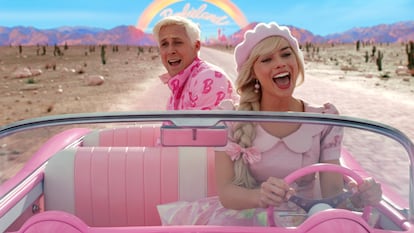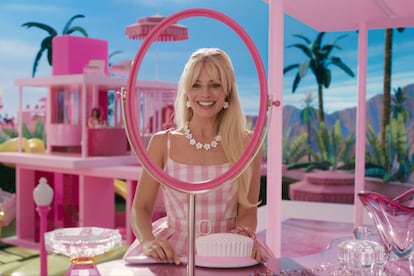‘Barbie’: An overly calculated, complacent feminist self-parody
With Greta Gerwig behind the camera and Margot Robbie in front of it, the Mattel star is the heroine of a meta-comedy about toys and gender, in which Ryan Gosling’s empowered Ken doll steals the spotlight


It can’t be easy being a doll as famous and self-aware as Barbie. Born in 1959, three years before her good friend Ken, the star of the Mattel toy company has undergone infinite changes to adapt to social movements and criticism: from a happy and carefree housewife to a doctor, firefighter, astronaut and president. Her creator, Ruth Handler, one of the founders of a company that emerged from a furniture business on the brink of bankruptcy, came up with it when she observed how her daughter, Barbara, despised playing house with baby dolls and wanted an adult doll that reflected herself.
The reflection is somewhat distorted. Created in the mold of a cold blonde mannequin — narrow hips, wasp waist, pointy breasts, tiptoe feet — Barbie has represented the feminine ideal of the so-called American dream like few others. She also embodies its dark side. In 1988, the cult experimental film Superstar: The Karen Carpenter Story, made by Todd Haynes while he was still a student, used the perfect doll to talk about death and anorexia.
As was foreseeable, the film directed by Greta Gerwig, with Margot Robbie as the protagonist and producer, pushes against that pernicious 90-60-90 ideal gracefully but without drawing blood and, unfortunately, without much originality or surprise. Although it’s impossible not to laugh at the biting dialogue or Robbie’s sad clown face — as when a group of girls confronts her in a schoolyard calling her a “consumerist and fascist” toy —, Ryan Gosling’s empowered Ken, and his hilarious discovery of “patriarchy,” is the most brilliant aspect of a film that skillfully plays the feminist card without going beyond the surface.

Correct in its political-incorrectness, Barbie opens after an exhausting bombardment of marketing that has plagued social media. The mammoth marketing operation is tinted bubblegum pink, an absolute triumph of the Pantone 219 C that characterizes the world of tes toy, whose omnipresence has robbed much of the surprise factor from a film that sustains itself thanks to its recreation of the Barbieland universe. Beyond the pink, the fantasy recalls the closed set of Peter Weir’s The Truman Show and in its broken-toy emotions the saga of Toy Story, both movies far superior to Gerwig’s release.
Barbie is part of the strategy initiated in 2018 by the new management of Mattel, a company that now aspires to reinvent itself from a toy factory to an intellectual property factory. Just as the comic book publisher Marvel went from near ruin to become a Hollywood giant, Mattel aspires to become the next big franchise. Barbie is only the beginning of the new Mattel Films, which will continue with Polly Pockets in a film written and directed by Lena Dunham and with Lily Collins as the protagonist and producer. Directors like JJ Abrams will develop the new life of other toys.
In 2019, a year after the company changed direction, the project to take the Mattel star to the movies passed into the hands of Warner Bros and Margot Robbie, who hired Gerwig and her partner, the director and screenwriter Noah Baumbach, to write a new development. Until then, Sony owned the exploitation rights. Diablo Cody, writer of Juno; Jenny Bicks, author of Sex and the City, and the actresses Amy Schumer and Anne Hathaway, also had a Barbie embryo in their hands. As Cody herself explained, the main stumbling block was that, until recently, the Mattel star was seen as a bimbo, far from the feminist values that she has now claimed.
This feminism is incapable of finding stimulating ideas outside of the clichés of sorority and flat shoes. After reaching the peak of her career with the extraordinary Lady Bird (2017), Gerwig knew how to package a message for Hollywood with her version of Little Women (2019). Now, she goes a step further with the facelift of a toy whose self-parody is self-satisfied and overly calculated.
Sign up for our weekly newsletter to get more English-language news coverage from EL PAÍS USA Edition
Tu suscripción se está usando en otro dispositivo
¿Quieres añadir otro usuario a tu suscripción?
Si continúas leyendo en este dispositivo, no se podrá leer en el otro.
FlechaTu suscripción se está usando en otro dispositivo y solo puedes acceder a EL PAÍS desde un dispositivo a la vez.
Si quieres compartir tu cuenta, cambia tu suscripción a la modalidad Premium, así podrás añadir otro usuario. Cada uno accederá con su propia cuenta de email, lo que os permitirá personalizar vuestra experiencia en EL PAÍS.
¿Tienes una suscripción de empresa? Accede aquí para contratar más cuentas.
En el caso de no saber quién está usando tu cuenta, te recomendamos cambiar tu contraseña aquí.
Si decides continuar compartiendo tu cuenta, este mensaje se mostrará en tu dispositivo y en el de la otra persona que está usando tu cuenta de forma indefinida, afectando a tu experiencia de lectura. Puedes consultar aquí los términos y condiciones de la suscripción digital.








































